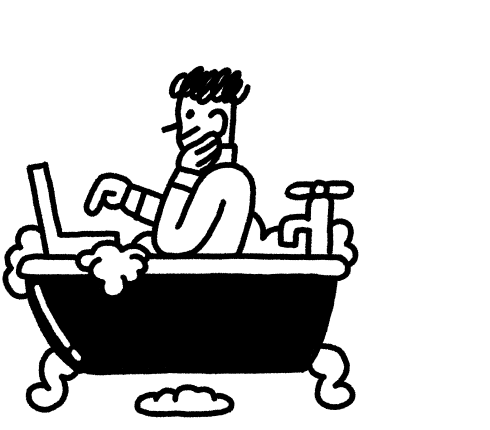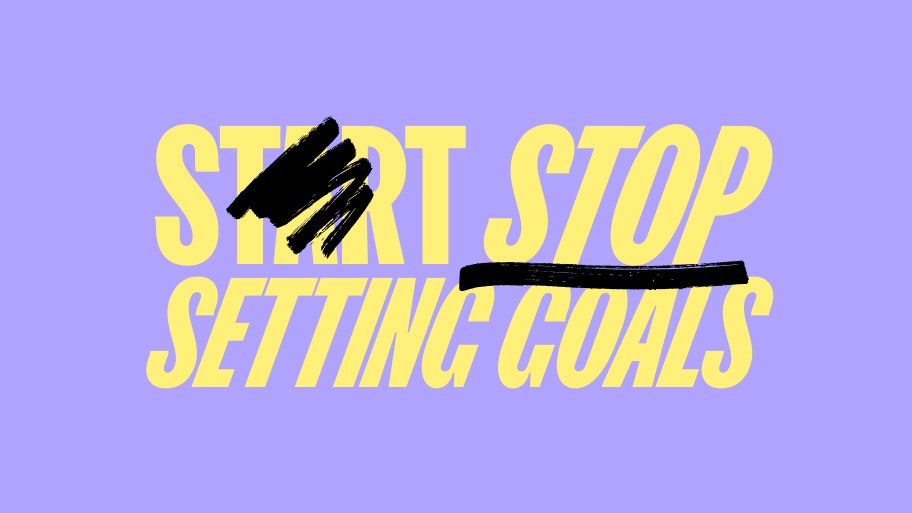In his #1 New York Times best-selling book Atomic Habits, James Clear remarked there are three core problems with goals:
- Winners and losers have the same goals
- Achieving a goal is only a temporary change
- Goals restrict your happiness
When I first read that… It felt like I found an oasis after wandering around a burning, dry desert for years.
Take it from someone who tried “setting goals” for years but never got anywhere – if you want to be 10x more productive, stop setting goals and start building systems.
See, “setting goals” never really worked for me, which filled me with frustration and self-loathing. I tried everything. I read every book. Everyone said the same thing: Goals were the only way to truly succeed. If you didn’t have good goals, they said, you’d never be successful.
So why couldn’t I follow through on even a single little goal? What’s wrong with me? I asked myself. Was I lazy? Undisciplined? Was I doomed to never achieve my dreams?
For example: I’d been trying to “go to the gym” for years. I was overweight and out of shape, and at one point, getting fit was my number one goal.
I remember fully committing. I went to a bodybuilding website and downloaded a 16-week nutrition and workout plan. I bought an expensive membership to a gym. I posted on social media so people could keep me accountable. I binged on all my favorite foods the night before, then started my 16-week plan.

The first week was rough, but I was expecting that. I went to the gym five times. I ate salads and grilled chicken breast and drank only water.
The second week was even harder. I went to the gym four times. I was getting tired of the salads.
The third week came, and I almost broke. I went to the gym two times and cheated in my diet by eating fast food a couple of times.
The fourth week, I stopped going to the gym.
This is what “setting goals” meant to me. This is what I experienced every damn time – trying to save money, lose weight, eat healthier, write my book, start a business, whatever. Goals just didn’t seem to work for me.
And finally, finally, someone described goals in a way that made sense: They were temporary, difficult, and not fun.
So I ditched goals for good. And ever since, I’ve been 10x more productive. I started consistently achieving truly enormous goals I never thought I’d finish:
- I signed my first book deal and published my first book
- I quit my 9-5 job and became a full-time six-figure entrepreneur working for myself
- I gained over 100,000+ followers and subscribers
- Over three million people have read my work in the past couple of years
Goals weren’t working for me. But systems were changing my life in every area.

Don’t wait for someone else to do it. Hire yourself and start calling the shots.
Get Started FreeWhy Systems Are the #1 Best Strategy to Consistently Achieving Enormous Goals
I’m not anti-goals. Goals are useful in certain situations. As Scott Adams, creator of Dilbert comics, once wrote:
Goals work great for simple situations. But the world is rarely simple these days.
You don’t know what your career will look like in a year. You don’t know what the economy will be doing, or which new technologies will hit the scene.
Your personal life is just as unpredictable….
So instead of goals, try systems that improve your odds of success (however you define success) over time.
Choose projects that improve your personal value no matter how the project itself does. Find systems for diet and fitness that replace willpower with simple knowledge.
Here’s the difference between goals and systems (and why systems are so much better):
Goals are about following routines, putting in a certain amount of effort to (hopefully) reach a deadline. Good goals are supposedly specific, measurable, achievable, relevant, and time-based.
On the other hand, systems are about consistency, making small progress every day. Systems make sure you always have enough leftover energy for tomorrow.
After years of building systems for my relationships, health, career, money, and mindset, I’ve realized that systems are the #1 best strategy to consistently achieve big goals.
When I wrote my book, I tried setting goals for myself – “write 1,000 words a day” or “finish a chapter each week,” things like that.
That didn’t work. Actually, those goals only made me more stressed, anxious, and frustrated with myself because I fell behind so quickly.
Then I tried using systems. Instead of word counts or deadlines, I just focused on writing a little bit, each day. I gave myself lots of breaks. I was kind to myself. I always made sure I had enough energy left over for the next day.
By the end of that month, I’d almost finished writing the whole book. I’d written about 10x more that month because I wasn’t wasting energy trying to follow goals.
Best of all, I was having fun doing it! I wasn’t getting angry with myself for falling behind or whipping myself to work harder and meet my deadline. Remember, “goals” are temporary and based on logistical timelines, not actual human behavior. Systems allow you time and space to go at your own pace.
A lot of people waste enormous unnecessary energy trying to cope with difficult goals; if they fall behind even one or two days, shame and frustration start entering your mindset (even if you’re making good progress).
Systems don’t waste energy, they allow you to build powerful momentum, which is the most important part.

How to Build Unstoppable Momentum and Accomplish Your Ten-Year Plan in Six Months
Thirty years ago my older brother, who was ten years old at the time, was trying to get a report written on birds that he’d had three months to write, which was due the next day. We were out at our family cabin in Bolinas, and he was at the kitchen table close to tears, surrounded by binder paper and pencils and unopened books about birds, immobilized by the hugeness of the task ahead. Then my father sat down beside him, put his arm around my brother’s shoulder, and said, “Bird by bird, buddy. Just take it bird by bird.” – Anne Lamont, Bird By Bird
Most people never really build any momentum when trying to achieve their goals. They hit speed bumps; they get busy at work, they get unmotivated, they binge on distractions and entertainment. That’s the point most people quit, accomplishing virtually nothing.
But when you build momentum, it’s like you can’t stop making progress even if you tried. It’s like a runaway train – it’s just going to keep on going, even if it runs out of fuel. Momentum carries it through. That’s the power of momentum, and if you can learn how to build unstoppable momentum in your life, you can achieve your biggest goals in a few short months.
The key to building momentum is repetition. If you can do something every day, even if it’s boring and tedious, you can build enormous momentum that can’t be stopped. Once you create these habits, you’ll find yourself making huge progress without even feeling like you’re trying. As best-selling author David Kadavy once wrote, “When you build a habit, you don’t have to spend mental energy deciding what to do.”
The problem is, most people don’t want to push through boredom. In the words of best-selling author Hal Elrod, “Repetition can be boring or tedious – which is why so few people ever master anything.”
Even if you don’t know the exact next steps to take, you probably at least know the direction you need to go to achieve your biggest goals.
That path always requires a lot of repetitive exercises – mastery always does.
Are you willing to push through the boredom of consistency? If you are, you can achieve mastery and skills that most of the world won’t. If you’re willing to do what most people aren’t, you can get things most people will never have.
Successful people do what unsuccessful people are unwilling to do. – Best-selling author Darren Hardy
When you start building momentum, you quickly realize that your long-term goals can actually be accomplished extremely quickly. Once you stop wasting time trying to meet deadlines and just work, your life undergoes a dramatic change.
Once you make progress your primary focus, you start building momentum in every area of your life. Soon, you’ll start accomplishing things in one week that usually take people six months to finally complete.
Conclusion
For some people, they can follow predictable routines throughout their week; they go to the gym, shop for groceries, and sleep in on the same days at the same time most weeks.
But for most people, following these routines is nearly impossible. Trying to maintain them leads to frustration and exhaustion, which only wastes more time – and makes you feel worse about yourself.
Instead, just focus on making small progress, every day. Because if you can do something every day, you’ll eventually build the most fundamental virtue of success:
Consistency.
See, consistency beats talent. It beats luck and good intentions. If you’re consistent, you can achieve pretty much any goal you set because as long as you keep putting in the work, you’ll achieve it eventually.
In an interview, actor Will Smith was asked how he got to have such a successful career:
The only thing that I see that is distinctly different about me is I’m not afraid to die on a treadmill. I will not be out-worked, period. You might have more talent than me, you might be smarter than me, you might be sexier than me, you might be all of those things. But if we get on the treadmill together, there’s two things: You’re getting off first, or I’m going to die.
Once you cultivate this discipline, you can build unstoppable momentum, become 10 times more productive, and achieve your biggest goals in a matter of months.
Make small progress, every day.




